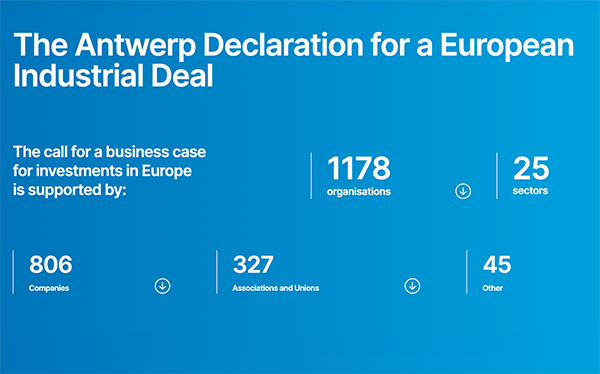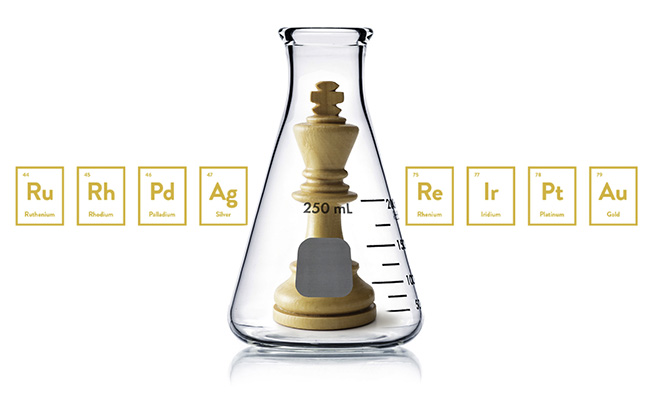
The EPMF’s key asks for the European Parliament and European Commission
In 2024, the European Parliament and European Commission will have new leadership for the upcoming five years, setting rules and goals for its industry and citizens. The EPMF priorities remain the same: strong growth in industrial development, support for the EU’s greening and net-zero policies and ensuring regulatory coherence and predictability.
The Antwerp Declaration: call for the European Industrial Deal
The EPMF co-signed the Antwerp Declaration that emphasizes an urgent need for clarity, predictability, and confidence in Europe and its industrial policy. Together with more than 1,000 signatories, we are calling for the appointment of a Vice President responsible for delivering the European Industrial Deal.
Our key asks
- Put the Industrial Deal at the core of the new European Strategic Agenda for 2024-2029.
- Make Europe a globally competitive provider of energy, e.g. increase uptake of renewable energy through the promotion of Power Purchase Agreements.
- Improve the EU’s raw materials security, e.g. swift implementation of CRMA and NZIA, coherence of policy actions.
- Boost demand for net zero, low carbon and circular products, e.g. strong ESG criteria in public procurement.
- Leverage, enforce, revive and improve the Single Market, e.g. more harmonisation on remaining issues of the Waste Shipments Regulation: rapid implementation, automatic tacit consent, boost collection and recycling of critical raw materials.

The Critical Raw Materials Act
Our key asks
- Tangible actions and an expedited implementation of the CRMA. The provisions set up in the CRMA should be easily achievable and not hampered by lengthy, burdensome application processes.
- Effective implementation of the EU waste policy framework to boost the collection and sorting of products containing precious metals and guarantee high-quality recycling.
- Always consider consistency with other EU policies in particular the REACH revision.
- Introduce a flagship Industrial Deal that improves the fundamental business case for Europe’s strategic industries, led by a new First Vice President. More in the Eurometaux Manifesto.

Chemicals Management : REACH revision
Our key asks
- More transparency and predictability in the various REACH processes.
- The chemicals risk management phase should start with a transparent prioritisation system to facilitate data collection and predictability.
- Risk management under REACH should remain risk-driven and consider exposure potential in addition to hazard.
- Safer and more sustainable alternatives within a lifecycle approach should be considered to avoid inappropriate substitution.
- Ensure the specificities of precious metals and metals in general are considered.

Circular Economy: Waste Policies
Our key asks
- The industry’s main challenges are the need for more information about substances of concern in products and waste, their presence in recycled products, and difficulties in applying EU waste classification methodologies.
- One of the remaining issues for the EPMF within the current WSR is primarily related to the pre-consented facilities. The EPMF asks that (i) the status of the pre-consented facilities should be accepted across the Member States and (ii) for the provision of automatic recognition of pre-consented status issued by a Competent Authority in one Member State by all EU Member States.
- Rapid implementation of the new measures such as Electronic Data Interchange to guarantee more efficient and fast intra-EU waste shipments.

Responsible Sourcing : EU Conflict Minerals Regulation
Our key asks
- The Regulation requires a more in-depth involvement of the entire supply chain rather than focusing exclusively on (upstream) EU importers.
- Lower the gold threshold to cover all gold imports that fall within the scope of the Regulation, effectively following already established industry initiatives. The current 100kg regulation trigger for gold ores and concentrates risks weakening the standards, potentially resulting in reputational consequences for the industry.
- Move forward with the recognition of the supply chain due diligence schemes.
- Coherence with other EU legislation, especially regarding due diligence obligations and standards.

